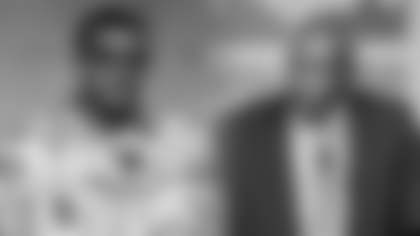The very nature of my "Way Back Wednesday" columns is that they reach back into the past for a look at something that used to be.
Any time the Denver Broncos travel to Houston for a game, be it vs. the Texans or back in the day against the Oilers, I am reminded that these two cities do not just go back, they go all the way back.
Denver and Houston were charter members of the American Football League, but the Broncos were the unloved stepchildren compared to the moneyed franchises like Dallas (later Kansas City, owned by AFL founder Lamar Hunt), Los Angeles (the Chargers, later in San Diego and now back in Los Angeles, originally owned by Barron Hilton), and of course the Houston Oilers, owned by Texas oilman Bud Adams.
Adams and the city of Houston were vital to the success of the AFL.
An expansion league can get by with a couple of smaller cities or markets as long as it has the big dogs, and Adams and his Oilers decidedly fit that role.
Hunt had been very hungry for a pro football team for his beloved Dallas, and after being repeatedly rebuffed by the National Football League both in his plea for an expansion franchise and also in his bid to buy the Chicago Cardinals before their move to St. Louis, he started his own league.
The city of Houston did not have any major league sports teams at that time, but they did have an original wildcat oilman named Bud Adams, who jumped at the chance to join Hunt in the new venture.
In fact, several months after the AFL was formed, it was suggested by some that Denver just was not big enough and that owner Bob Howsam did not have pockets as deep as those aforementioned owners. When brought to the attention of Adams, however, he said, "A deal is a deal. Denver stays, and I like that guy." End of debate.
In fact, the eight original AFL owners were dubbed "The Foolish Club," a reference to their likelihood to lose big sums of money.
However, in part because the league offered two teams in Texas and, of course, one in New York, along with the fact that ABC was on the outside looking in regarding television contracts, ABC quickly struck a deal to televise all AFL games, and the path of pro football history was forever altered.

The AFL lasted for a full decade and became the first expansion league ever to see all its member clubs taken into the more significant league when the merger took place.
As for the Houston Oilers, they made a huge splash with the signing of Heisman Trophy winner Billy Cannon, monumental news at the time. With his help, the Oilers won the first two championships in AFL history, defeating the Chargers in both title games.
And of course, the Oilers treated Denver just about like every other strong AFL team did at the time, winning nine of the first 10 games played against the Broncos, scoring 45, 55 and 45 in three of the first four wins over Denver.
Old Chicago Bears retread George Blanda was Houston's first quarterback, and no one would have guessed that he would extend his career from 1949 with the Bears through seven seasons with the Oilers (1960-66) and then continue to play for nine more seasons with the Oakland Raiders, ending his 26-year career on the steps of the Pro Football Hall of Fame in Canton.
Two of the most notable early Bronco games were against Houston in 1966, with Denver failing to record a single first down on opening night in a debacle of a loss to the Oilers.
Then, just four weeks later the Broncos rebounded with a stirring 40-38 win over Houston in the Mile High City, with Blanda accounting for all 38 Oilers points. He threw five touchdown passes, kicked five extra points and added a field goal for good measure.
In one of those odd-but-true moments, Denver defensive back Goldie Sellers returned a kickoff for a touchdown in each game.
Once the Broncos got good, they reversed the losing trend against Houston.
Denver was 9-7 against the Oilers after that initial horrific decade, and the Broncos come into this week's game with a 4-3 regular-season record against the Houston Texans.
And this game features the only two opponents who have never had a non-sellout during their time in the National Football League.
Of course, the Texans were an expansion team and began play within America's long-developed passion for pro football.
Even though the Broncos began play in 1960, they (and the rest of the AFL) officially became members of the NFL in 1970, and that was the year in which our fabled sellout streak began, so Denver has not had a non-sellout game as members of the NFL.
And it will be sold out again this week in Houston, with the two cities sharing 60 years of history when the Broncos and Texans take the field.














